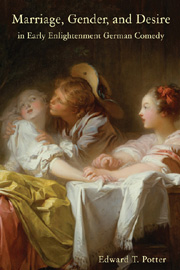Book contents
- Frontmatter
- Contents
- Acknowledgements
- List of Abbreviations
- Introduction: Comedy, the Sentimental Marriage, and Modes of Resistance
- 1 Promoting the Sentimental Marriage in Theory and in Practice
- 2 The Virgin Huntress Tamed: J. C. Gottsched's Atalanta and the Erasure of Female Autonomy
- 3 Marriage Brokering at the Expense of Economics: C. F. Gellert's Die zärtlichen Schwestern
- 4 The Clothes Make the Man: J. E. Schlegel's Der Triumph der guten Frauen
- 5 Cross-Dressing and Gender Performance in G. E. Lessing's Der Misogyne
- 6 Sickness Masks Desire in Th. J. Quistorp's Der Hypochondrist
- Conclusion
- Works Cited
- Index
Conclusion
Published online by Cambridge University Press: 05 February 2013
- Frontmatter
- Contents
- Acknowledgements
- List of Abbreviations
- Introduction: Comedy, the Sentimental Marriage, and Modes of Resistance
- 1 Promoting the Sentimental Marriage in Theory and in Practice
- 2 The Virgin Huntress Tamed: J. C. Gottsched's Atalanta and the Erasure of Female Autonomy
- 3 Marriage Brokering at the Expense of Economics: C. F. Gellert's Die zärtlichen Schwestern
- 4 The Clothes Make the Man: J. E. Schlegel's Der Triumph der guten Frauen
- 5 Cross-Dressing and Gender Performance in G. E. Lessing's Der Misogyne
- 6 Sickness Masks Desire in Th. J. Quistorp's Der Hypochondrist
- Conclusion
- Works Cited
- Index
Summary
This study has examined various subgenres of early Enlightenment German comedy and has demonstrated the ways in which these comedic texts are involved in the propagation of the new concept of the sentimental marriage, each to a greater or lesser extent. The satirical Saxon comedy, the sentimental comedy, and the pastoral play were involved in constructing their own symbolic universe, in which marriage functioned differently than it did in the contemporary cultural context, where socioeconomic factors retained at least some degree of importance in matrimonial considerations. The literary texts of the Gottschedian stage constructed concepts of alternative modes of resistance to the emerging sentimental discourse on marriage that the texts disseminated. Oftentimes, these alternative modes of resistance had little direct bearing on contemporary eighteenth-century culture or were programmatic reworkings of potentially subversive elements.
Unmarried women, for example, were in a comparatively weak economic and social position in early Enlightenment German society, yet Gottsched's text depicts a radically autonomous, Amazon-like woman scoffing at love and marriage and posing a very real threat to the shepherd society in which she moves. Gellert's Julchen depicts a contemporary marriage resister, and as such, she poses a more subtle — and more easily defused — threat to the marital economy in that piece. Similarly, same-sex desire is brought onto the stage in order to be ridiculed and dismissed in the end in Quistorp's play; hypochondria, the fashionable eighteenthcentury sickness, is ridiculed and dismissed as well.
- Type
- Chapter
- Information
- Publisher: Boydell & BrewerPrint publication year: 2012



